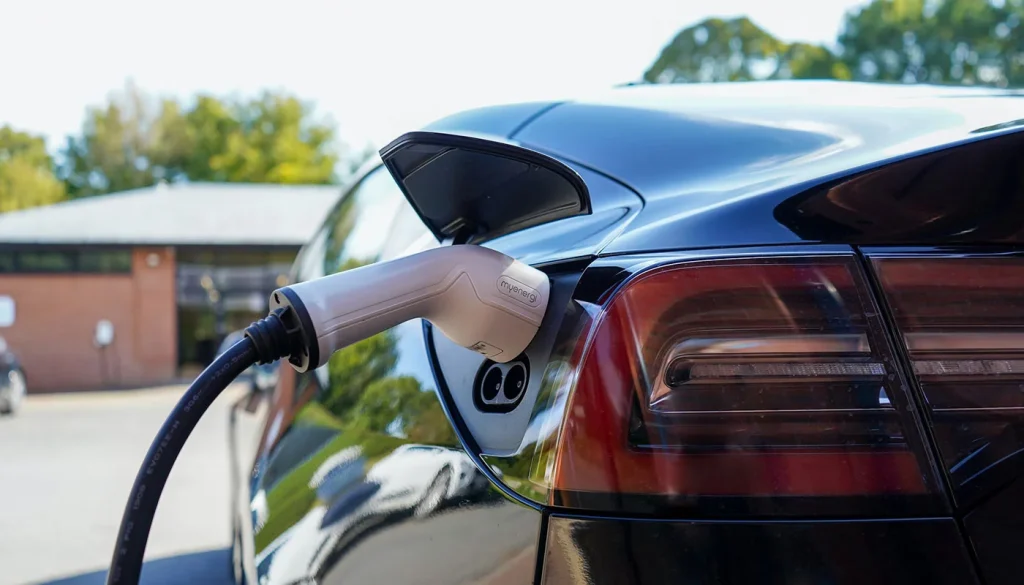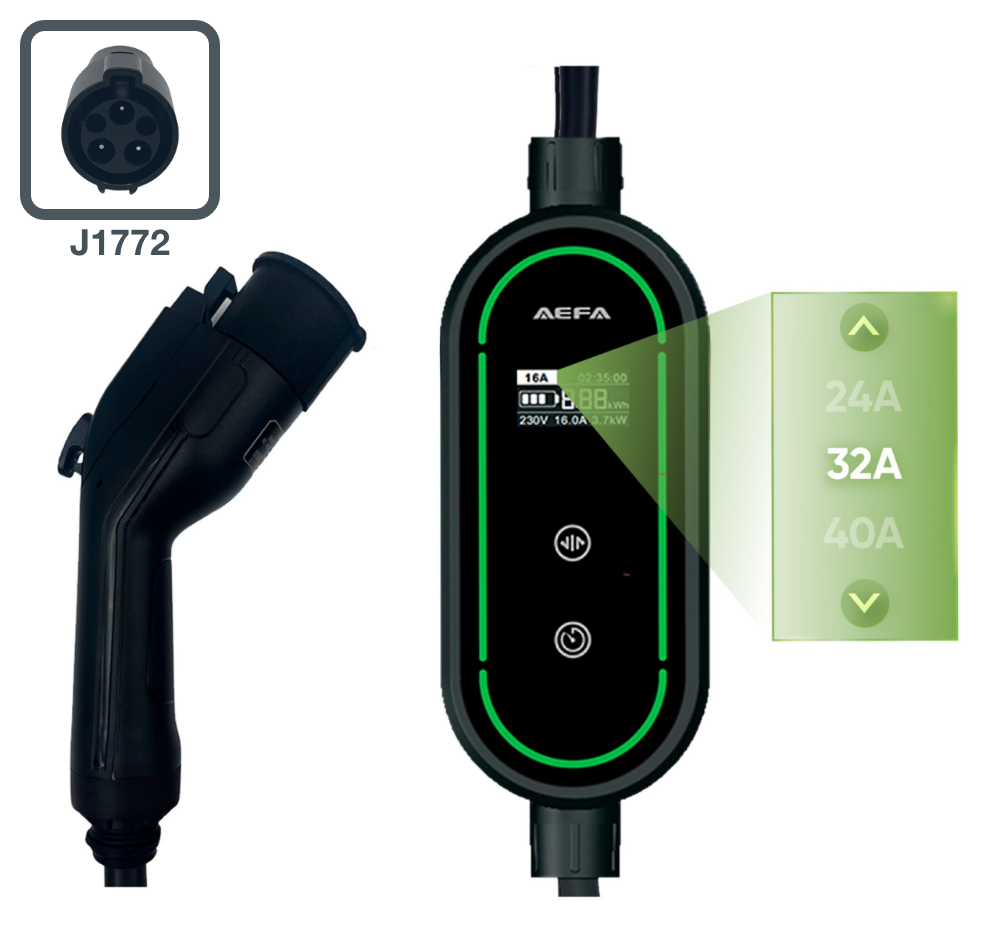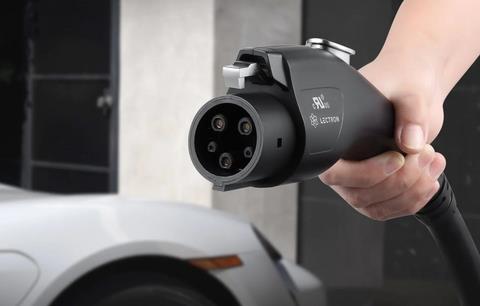Not sure about choosing a charger? Try our revamped Charger Finder!
Try our revamped Charger Finder!
- For Installations
- All our chargers come with a 1 year warranty
- Free Shipping
November 27, 2023

Until the end of 2024, all EVs and plug-in hybrid vehicles will use the J1772 connector. By the end of 2024, large car manufacturers will switch from the J1772 connector to the NACS connector type.
NACS stands for North American Connector Standard. It is a Tesla-owned proprietary charging connector for all Tesla models. The NACS connector is used by Tesla at all of its residential and commercial charging stations.
Hyundai, Genesis, Kia, Ford, GM, Rivian, Polestar, and Honda have announced plans to switch to NACS connectors. Ford will be the first at the end of 2024.

Based on my use of NACS and J1772 designed charging cable, the NACS cable and connector is lighter, easier to connect, more maneuverable, and thinner.
The medium-term trend over the next 5-8 years will be the adoption of the NACS connector. Tesla has built a superior connector, has more infrastructure, and available charging stations that are more reliable with superior payment technology. J1772 will remain prevalent due to its use for the last decade on all EVs and plug-in hybrids but will slowly be phased out by car manufacturers.
Today’s hot topic in the EV world is understanding the differences between a J1772 and a NACS connector. In this article, I will explain what they look like, what are the differences, which care makers use J1772 or NACS, and what are the future trends
J1772 refers to the type of connector that is on the end of the charging cable that connects to the charging receptacle on a vehicle. It is a 5-pin electrical connector standard that supports single-phase alternating current (AC) charging rates.
J1772 is also referred as a type 1 connector or SAE J1772

Based on my use of NACS and J1772 designed charging cable, the NACS cable and connector is lighter, easier to connect, more maneuverable, and thinner.
The medium-term trend over the next 5-8 years will be the adoption of the NACS connector. Tesla has built a superior connector, has more infrastructure, and available charging stations that are more reliable with superior payment technology. J1772 will remain prevalent due to its use for the last decade on all EVs and plug-in hybrids but will slowly be phased out by car manufacturers.

Until the end of 2024, all EVs and plug-in hybrid vehicles will use the J1772 connector. By the end of 2024, large car manufacturers will switch from the J1772 connector to the NACS connector type.
NACS stands for North American Connector Standard. It is a Tesla-owned proprietary charging connector for all Tesla models. The NACS connector is used by Tesla at all of its residential and commercial charging stations.
Hyundai, Genesis, Kia, Ford, GM, Rivian, Polestar, and Honda have announced plans to switch to NACS connectors. Ford will be the first at the end of 2024.

Based on my use of NACS and J1772 designed charging cable, the NACS cable and connector is lighter, easier to connect, more maneuverable, and thinner.
The medium-term trend over the next 5-8 years will be the adoption of the NACS connector. Tesla has built a superior connector, has more infrastructure, and available charging stations that are more reliable with superior payment technology. J1772 will remain prevalent due to its use for the last decade on all EVs and plug-in hybrids but will slowly be phased out by car manufacturers.

It is most commonly used for residential charging since it provides alternating current charge, which is the only electrical service provided to residential properties in North America
The J1772 connector is only available for level 1 and 2 charging. It is not used for direct current or commercial charging, such as the large charging stations you may see at Walmart or Target. Those use a connector primarily called CCS1
Below is an illustrative diagram of a current EV charging port (not Tesla’s). The top portion is used for residential charging and the bottom portion for commercial, direct current charging.
Until the end of 2024, all EVs and plug-in hybrid vehicles will use the J1772 connector. By the end of 2024, large car manufacturers will switch from the J1772 connector to the NACS connector type.

Until the end of 2024, all EVs and plug-in hybrid vehicles will use the J1772 connector. By the end of 2024, large car manufacturers will switch from the J1772 connector to the NACS connector type.
NACS stands for North American Connector Standard. It is a Tesla-owned proprietary charging connector for all Tesla models. The NACS connector is used by Tesla at all of its residential and commercial charging stations.
Hyundai, Genesis, Kia, Ford, GM, Rivian, Polestar, and Honda have announced plans to switch to NACS connectors. Ford will be the first at the end of 2024.

Based on my use of NACS and J1772 designed charging cable, the NACS cable and connector is lighter, easier to connect, more maneuverable, and thinner.
The medium-term trend over the next 5-8 years will be the adoption of the NACS connector. Tesla has built a superior connector, has more infrastructure, and available charging stations that are more reliable with superior payment technology. J1772 will remain prevalent due to its use for the last decade on all EVs and plug-in hybrids but will slowly be phased out by car manufacturers.
Today’s hot topic in the EV world is understanding the differences between a J1772 and a NACS connector. In this article, I will explain what they look like, what are the differences, which care makers use J1772 or NACS, and what are the future trends
J1772 refers to the type of connector that is on the end of the charging cable that connects to the charging receptacle on a vehicle. It is a 5-pin electrical connector standard that supports single-phase alternating current (AC) charging rates.
J1772 is also referred as a type 1 connector or SAE J1772

Based on my use of NACS and J1772 designed charging cable, the NACS cable and connector is lighter, easier to connect, more maneuverable, and thinner.
The medium-term trend over the next 5-8 years will be the adoption of the NACS connector. Tesla has built a superior connector, has more infrastructure, and available charging stations that are more reliable with superior payment technology. J1772 will remain prevalent due to its use for the last decade on all EVs and plug-in hybrids but will slowly be phased out by car manufacturers.

Until the end of 2024, all EVs and plug-in hybrid vehicles will use the J1772 connector. By the end of 2024, large car manufacturers will switch from the J1772 connector to the NACS connector type.
NACS stands for North American Connector Standard. It is a Tesla-owned proprietary charging connector for all Tesla models. The NACS connector is used by Tesla at all of its residential and commercial charging stations.
Hyundai, Genesis, Kia, Ford, GM, Rivian, Polestar, and Honda have announced plans to switch to NACS connectors. Ford will be the first at the end of 2024.

Based on my use of NACS and J1772 designed charging cable, the NACS cable and connector is lighter, easier to connect, more maneuverable, and thinner.
The medium-term trend over the next 5-8 years will be the adoption of the NACS connector. Tesla has built a superior connector, has more infrastructure, and available charging stations that are more reliable with superior payment technology. J1772 will remain prevalent due to its use for the last decade on all EVs and plug-in hybrids but will slowly be phased out by car manufacturers.

It is most commonly used for residential charging since it provides alternating current charge, which is the only electrical service provided to residential properties in North America
The J1772 connector is only available for level 1 and 2 charging. It is not used for direct current or commercial charging, such as the large charging stations you may see at Walmart or Target. Those use a connector primarily called CCS1
Below is an illustrative diagram of a current EV charging port (not Tesla’s). The top portion is used for residential charging and the bottom portion for commercial, direct current charging.
Until the end of 2024, all EVs and plug-in hybrid vehicles will use the J1772 connector. By the end of 2024, large car manufacturers will switch from the J1772 connector to the NACS connector type.

Until the end of 2024, all EVs and plug-in hybrid vehicles will use the J1772 connector. By the end of 2024, large car manufacturers will switch from the J1772 connector to the NACS connector type.
NACS stands for North American Connector Standard. It is a Tesla-owned proprietary charging connector for all Tesla models. The NACS connector is used by Tesla at all of its residential and commercial charging stations.
Hyundai, Genesis, Kia, Ford, GM, Rivian, Polestar, and Honda have announced plans to switch to NACS connectors. Ford will be the first at the end of 2024.

Based on my use of NACS and J1772 designed charging cable, the NACS cable and connector is lighter, easier to connect, more maneuverable, and thinner.
The medium-term trend over the next 5-8 years will be the adoption of the NACS connector. Tesla has built a superior connector, has more infrastructure, and available charging stations that are more reliable with superior payment technology. J1772 will remain prevalent due to its use for the last decade on all EVs and plug-in hybrids but will slowly be phased out by car manufacturers.